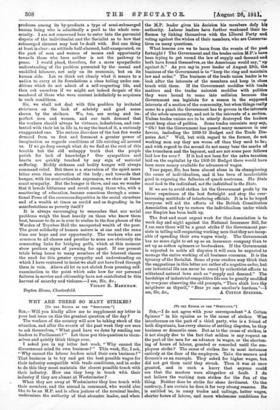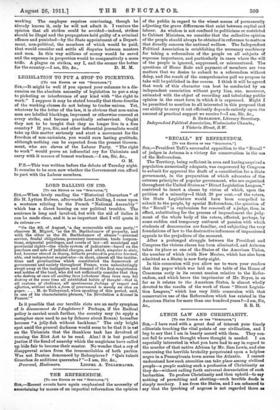[TO THE EDITOR OF THE "SPECTATOR. "] SIR, I do not
agree with your correspondent " A Cotton. Spinner" in his opinion as to the cause of strikes. Wise interference on the part of a third party, who is a friend of both disputants, has every chance of settling disputes, be they business or domestic ones. But as to the cause of strikes, is it not simply due to the fact that seldom is any request on the part of the men for an advance in wages, or the shorten- ing of hours of labour, granted or conceded until the em. ployees strike P The cause of strikes lies in most instances entirely at the door of the employers. Take the seamen and firemen's as an example. They asked for higher wages, but did not get them until they struck. Then it was at once granted, and in such a hurry that anyone could see that the masters were altogether at fault. I do not believe the working man strikes for the fun of the thing. Neither does he strike for sheer devilment. On the contrary, I am certain he does it for very strong reasons. He is entitled to, in many trades and callings, better wages, shorter hours of labour, and more wholesome conditions for working. The employer requires convincing, though he already knows it, only he will not admit it. I venture the opinion that all strikes could be avoided—indeed, strikes should be illegal and the propagators held guilty of a criminal offence and punished—by the State appointment of a Depart- ment, non-political, the members of which would be paid, that would consider and settle all disputes between masters and men. In this way millions of money would be saved and the expenses in proportion would be comparatively a mere trifle. A plague on strikes, say I, and the sooner the better for the country.—I am, Sir, &c., D. M. M.



































 Previous page
Previous page